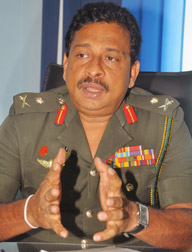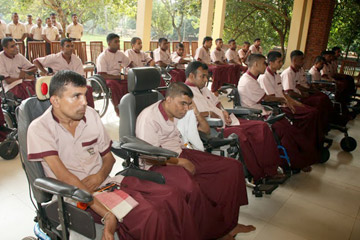Plans afoot to look after differently-abled ex-soldiers
By Dhaneshi Yatawara
There are 37,957 officers and soldiers who got disabled as a result
of battle injuries during the past three decades, said Adjutant General
of the Sri Lanka Army, Major General Jagath Dias. “Mind you, many other
officers and soldiers got wounded in the humanitarian operation.
|

Maj. Gen. Jagath Dias |
Yet, as they were categorised as minor wounds, they came back to
service. They also have their difficulties,” he said in an interview
with the Sunday Observer.
Responding to questions raised by the Sunday Observer based on news
reports last week on a group of ex-servicemen filing a Court case
against the authorities, Maj. Gen. Dias said, “We believe that there has
been a mis-communication that led this group of ex-servicemen to take
such a step. That is why we wanted to have a one-to-one discussion and
let them know the structure in place to look after them.”
Excerpts of the interview:
Q: According to recent media reports, you held discussions with
disabled war heroes about their grievances. Why did the Army take such a
step?
A: It is always better to sort things out through dialogue. The
established administrative network looking after war heroes did not
warrant a dialogue. However, we came to know through the print media
that a certain segment of these ex-servicemen have gone to Courts and
filed a case against the authorities. They say that their entitlements
are not paid.
By that time, we had already completed our report and recommendations
on the welfare of the war heroes and war veterans.
|

Some differently-abled soldiers who fought for their motherland |
It was my responsibility to produce this report. Earlier this year,
my staff and I completed the final report, considering changes in
numbers and medical conditions of the officers and soldiers. We believe
that there has been a mis-communication that led to this group of
ex-servicemen taking such a step.
That is why we wanted to have a one-to-one discussion and let them
know the structure in place to look after them, and make them aware of
what we have done as an organised institute.
Q: Do you believe that the established structure in the Army
administration is strong enough to look after war heroes?
A: We have a well-established system within the Army to look after
battle casualties which functions well. War heroes' welfare is a special
concern and even President Mahinda Rajapaksa often inquires from us
about it. Defence Secretary Gotabaya Rajapaksa and the Army Commander
constantly monitor the welfare measures for war heroes. At any
discussion related to the tri-services, the welfare of the war heroes
and war veterans tops the list.
We have done the administrative work to provide the service. Yet,
this is a very time-consuming procedure. When paying entitlements, each
officer or soldier has to be considered as an individual case. Each one
is different from the other. Evaluations cannot be done in groups. It
has to be taken case by case. Even in the same medical category,
individual cases are very different from each other.
Over time, the medical categorisation can change too. In certain
people, the wounds heal and their condition can improve. Yet, in certain
cases, depending on the severity of the wounds, the person's health can
deteriorate. Such cases need to be re-evaluated and re-categorised to
pay them the entitlements that suit the needs of the new situation.
Medical categorisation is the job of a doctor. A medical team handles
this job. Based on that, the Army staff carry out their work to pay the
war heroes' entitlements.
To date, all officers and soldiers with some sort of disability have
already gone through this process and paying entitlements is in
progress. This includes the group of 292 ex-servicemen who have gone to
Courts.
As soldiers, we always believe it is our duty to look after our
brethren who made sacrifices to safeguard the motherland.
Q: Is this the first time Army faced a Court Case of this nature?
A: In recent history, to my knowledge, this is the first time a group
of ex-servicemen, in an organised manner, have filed a Court case
against the Army.
Q: Why do you think this happened? Is it the increased number of
disabled soldiers after the last phase of operations depending on the
Army that could have made some of them feel less prioritised?
A: No, no. There is nothing like that. This is mainly due to a
misunderstanding. As I told you earlier, payments and entitlements for
these people were already under way.
Q: You mentioned medical categorisation as the basis in listing
entitlements for the war heroes. Who handles that?
A: It is the job of a specialist - a medical doctor. These soldiers
have to go through the medical expert's examination. It is only after
receiving the complete reports from medical experts that administrative
work starts in allocating entitlements, compensations and payments.
Q: What is the procedure in deciding entitlements for war heroes?
A: When a solider gets wounded, he is first sent for medical
treatment and then for rehabilitation if necessary. Then, through his
battalion, he reaches the first administrative level which is his
regiment. The unit the soldier belongs to has a board of inquiry and
that is the beginning of the administrative process. Then the result is
sent to the Regimental Centre.
Then the soldier's requirement for compensation is sent to the
Directorate of Medical Services and he should go for a medical
examination. With the medical reports and categorisation, the soldier's
case is sent to the Director Legal's office.
Then the reports go to the Pay and Pension Directorate.
Since the medical condition of these soldiers can change over time,
medical examinations are open for any of them at any time. If the
soldier faces a change in his health, he can again come to medical
experts for re-examination through his regiment. Even those who return
to service face health complications due to their wounds and they can
also get examined by the medical experts.
Based on the re-categorisation, the soldiers’ situations are
re-evaluated and compensation and entitlements are paid accordingly.
This is a continuous process. This is all based on rules and regulations
imposed by the Government. The Cabinet Paper approved on July 28, 1982
states the entire procedure.
Q: What is the total number of Army personnel with disabilities
depending on these entitlements?
A: There are 37,957 officers and soldiers who were disabled during
the past three decades. This includes 1,298 Army officers and 36,659
Other Rankers. They all performed their duties above their abilities and
with gratitude, we look after them.
Some of the soldiers among these numbers are totally disabled. They
are the ones who are looked after at the Abhimansala, Ranaviru Sevana
and Mihindu Seth Medura. Many other officers and soldiers got wounded in
the humanitarian operation, yet, as they were categorised as minor
wounds, they came back to service. They also have their difficulties.
Q: During the humanitarian operation, Sri Lanka's Forces drew out
their
entire strength to save the country from terrorism. Was there a
significant increase in the number of wounded within those three to four
years, compared to the two-and-a-half decades that had passed?
A: Definitely, there was a great increase during that short period.
During the humanitarian operation, 311 officers and 18,120 Other Rankers
got wounded and now live with permanent disabilities.
They are included in the above mentioned total.
Of the three Forces, it was the Army which had the highest number of
persons and infantrymen fighting the enemy face-to-face. Out of that,
around 80 percent was represented by the Infantry. They went in to the
enemy lines to break the barricades and defence lines.
The humanitarian operation is the biggest rescue mission that we had
conducted. And for that, the entire strength of the Army was engaged,
unlike in the past. So the casualty numbers were greater.
Q: We see and hear of donations and assistance given to war heroes
through Seva Vanitha Units, by well-wishers and other organisations.
This is in addition to the entitlements they receive from the Army. Are
these support measures implemented according to the same categorisations
you mentioned earlier? A: Yes. This is one of the best things that
happen for the betterment of these war heroes. I think the Sri Lanka
Army is one of the few military organisations in the world which looks
after their war heroes with such a high level of care. They are given
priority. In fact, war heroes are looked after at three levels. First,
by the Regiment and the Regiment Seva Vanitha Units have separate
programs to look after them. Donations and support from well-wishers and
other organisations are streamlined to them.
The second tier is at the Army level. The Army Seva Vanitha Unit is
totally involved in this. We also have a special directorate to look
after war veterans, called the Directorate of Veterans Affairs.
This is totally dedicated to serve war veterans. It provides not only
houses and money, if the soldiers do not have land, that is also
provided. Recently also, we handed over land for war heroes which we had
received from a well-wisher from Payagala. Scholarships are given to war
heroes' children to support their studies. These activities happen
continuously. |

